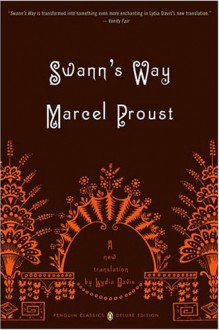
I fully appreciated this version of the novel for two reasons: I had read the Graphic Novel of the book (comic book) by Stephane Heuet, and I absolutely always love a George Guidall narration. I haven't listened to the other versions of this volume by other narrators, there's no need to since nobody narrates better than Guidall.
For me, this is a rare fictional book in which I would have been served by reading the physical copy since I could have underlined all of the brilliant lines within the text which clearly transcended the story that is ostensibly being told. Though, the interview at the end by the Proust expert mentions that the book is noted for it's extremely long sentences, but that would have confused me if I had to read it but for which I didn't really notice while listening.
This book was definitely worth while for me even though I almost never tip my toes into the murky water of great fiction, but I enjoy philosophy and this book within the text has plenty of insights into philosophy. I had noticed that Sartre in 'Being and Nothingness' had quoted from this book multiple times. There is a philosophical question that glides thru this book: 'how do we know what we know" and how our external and internal worlds form our perceptions, and of course the question of time and memory. But, I'll leave it to the individual listener to find their own wisdom within this book and to understand why this book is said to be the greatest book of the 20th century.
The book can be hard to follow because so much of it deals with "involuntary memory" excursions, but having had read the comic book fairly recently before listening to the story, I was never overly confused by where the narrator was in the story. (The expert at the end of the story mentioned that the narrator of this book does give his name once and his name is Marcel).
There is an extremely funny line in the book and I would not have understood it unless I had read the comic book and had my DNA sampled by 23andMe. It turns out there is a gene which some people carry which makes their 'chamber pot' smell of perfume if the person eats asparagus. The author makes use of that fact and says a line about that (though in this translation they say 'chamber' not 'chamber pot') and would have gone completely passed me if I had not been aware of that effect or had not read the comic.
My advice for people who want to read great literature but get confused by it because they can't always understand it is 1) get the graphic novel and 2) get this version narrated by Guidall, and you will be surprised by how much you'll get out of this book.
 A challenging, amazing, unique book. If you want to try reading it, don’t get quickly discouraged; just put down the book and come back to it later. For me, the third section, “Swann in Love,” was the most accessible, so if you’re stuck on the first two sections, you could just skip ahead and read them later.
A challenging, amazing, unique book. If you want to try reading it, don’t get quickly discouraged; just put down the book and come back to it later. For me, the third section, “Swann in Love,” was the most accessible, so if you’re stuck on the first two sections, you could just skip ahead and read them later.

 Log in with Facebook
Log in with Facebook 








